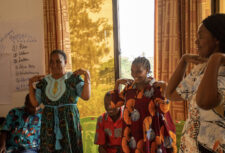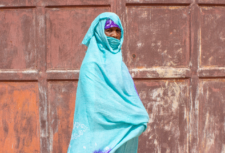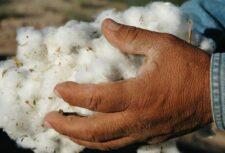Disclaimer: This article is more than 12 years old, and may not include the most up-to-date information or statistics. Please verify information with more recent sources as needed, and if you have any questions contact our Press Office.
15 November 2011
The European Parliament has overwhelmingly rejected a trade agreement with Uzbekistan that would have made it easier for the European Union to import textiles made by cotton harvested by children in slavery.
MEPS voted, 603 to eight, not to extend the current ‘EU-Uzbekistan Partnership and Cooperation Agreement’ to include the trade in textiles, including those made with cotton, from the former soviet republic. The European Parliament also raised questions over Uzbekistan’s continued benefit from preferential trade tariffs, despite the ongoing use of child slavery.
Uzbekistan is the world’s third largest exporter of cotton and each autumn hundreds of thousands of Uzbek school children, some as young as eight years old, are forced out of their classrooms and into the fields to pick the country’s cotton harvest. A document published in September by a single local region administration revealed plans to mobile 170,000 school children during this year’s harvest.
Following concerns over the continuing wide-spread use of child slavery in the Uzbek cotton industry, both the Foreign Affairs and International Trade Committees of the European Parliament refused to support the change to the current Agreement, which would encourage the imports to the EU.
Rarely paid for their work and forced to pick up to 50 kg of cotton a day, Uzbek school-children are threatened with expulsion if they attempt to refuse to take part in the harvest. Those who fail to meet their quotas or who pick poor quality cotton are reportedly punished by detention, told their grades will suffer or beaten.
Recent reports from the field reveal how the deputy director of a school in Olot district received an official warning for not registering pupils as present when they had been sent to the fields to pick cotton. In another case eight college directors were reportedly beaten by the mayor of Surkhandarya region on the 25 October and forced to pick cotton.
As well as teachers, other workers, including nurses, musicians and machinists, have reported they were threatened with the sack or a fine, usually US$125, several times more than their monthly wage, if they failed to take part in the harvest.
Uzbekistan has made no credible effort to end child slavery. It does not cooperate with the International Labour Organization even though it has signed up to international conventions against forced child labour. The Uzbek government has failed to invite in an ILO high level observer mission once again during this harvest.
Despite these concerns, Uzbekistan also continues to benefit from trade preferences with its inclusion in the European Union’s Generalised System of Preferences and this vote is also an opportunity for the European Commission to open an investigation light of this serious and systematic violation of human rights.
Anti-Slavery International, along with a group of British school-children, visited Brussels last week to raise awareness of the issue directly to MEPs and to hand in a petition signed by over 13,000 people, calling for the European Union, to help end child slavery in Uzbekistan.
Joanna Ewart-James, Anti-Slavery International Supply Chain Programme Co-ordinator, said: “By rejecting the deal the European Parliament has sent a strong message to Uzbekistan that it must end slavery. It is also very encouraging that Europe is finally looking to ensure its trade deals reflect its human rights concerns. Countries should not be financially rewarded for profiting from slavery.”
Catherine Bearder, MEP South East England, said: “The European Parliament has made it clear that Uzbekistan can not pretend that it is ‘business as usual’ while it continues to profit from child slavery.”
To sign Anti-Slavery International’s petition calling on the European Union to help end child slavery in Uzbekistan visit: www.antislavery.org/cottoncrimes.
For further press information or photos of children picking cotton in the fields of Uzbekistan, contact Paul Donohoe, Anti-Slavery International Press Officer, on 020 7501 8934 or p.donohoe@antislavery.org.





